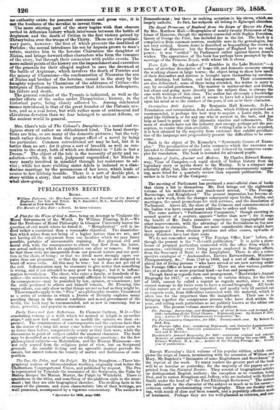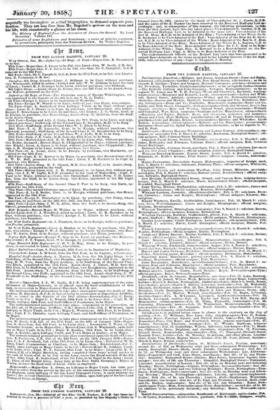PUBLICATIONS RECEIVED.
Booxs.
William Paterson, the Merchant &demon, and Founder of the Dank of .England: bis Life and Trials. By S. Bannister, M.A., formerly Attorney- of New South Wales.
The Morals of May Fair: a Novel. In three volumes.
.Plea for the Ways of God to Nan, being an Attempt to Vindicate the Moral Govermnent of the World. By William Fleming, D.D.—We -fear the Professor of Moral Philosophy in Glasgow University leaves the .question of evil much where he formd it. "Metaphysical" evil is in- deed rather a casuistical than a reasonable objection. The dissatisfac- 'don which arises from not being of a higher nature than we are' and not having all the enjoyment from our faculties which we may fancy possible, partakes of unreasonable repining. But physical evil and .moral evil, with the consequences to others that flow from the latter, .ene actual auffeling which no explanation can allay or remove. It may he that these evils are inseparable from our present nature and our posi- tion in the chain of being ; or that we dwell more strongly upon our pains than our pleasures; or that the pains we undergo are designed to ward off worse evils. All this May be true ; but it does net get rid of the evil. Inflammation may be necessary to give notice that something is wrong, and if not attended to may grow to danger; but it is inflam- mation nevertheless. The cheat, who ruins a family, or hundreds of fa- milies—the murderer, who may euperadd affliction to temporal ruin and its .consequences—may be punished by law, opinion, or conseienee; but the evils produced to others and himself remain. Dr. Fleming, like many others, can only show us that things are not so bad as they might be.
Theeeremarks apply to the " Plea " as a philosophic treatise. Considered as a series of sermons in which a Doctor of Divinity explains many puzzling things in the natural condition and moral government of the world, the book may be recommended, not as new in reasoning, but as clear, powerful, and popular instatement.
Early Years and late Reflections. By Clement Canyon, M.D.—The ,sooncluding volume of a work which we noticed at length in an earlier ;stage,* and now find small reason to modify the opinion we then ex - !tressed. The renthaiseences of contemporaries and the curious facts that in the course of a long life must come before ever- practitioner seem to as fewer than before, comparatively scanty as they then were, while the - di:imagines in point of subject exhibit the amateur character. The book may be described as a series of essays on religious questions ; for the few philosophical subjects—as Materialism, and the Human Microcosm—are 'not only argued from the religious point of view, but on Scriptural grounds. An amiable feeling and an agreeable manner pervade the essays, but cannot redeem the tenuity of matter and feebleness qf corn- 'position.
'The Pen, the Palm and the Pulpit. By John Stoughton.—Three bio- graphical notices of Gloucestershire worthies, originally read before the Cheltenham Congregational Union and published by request. The Pen is represented by Tynedale the translator of the Scriptures the Palm by Bishop Hooper the Marian Martyr, the Pulpit by Whitefield. There is quaintness in the titles, and something of the platform style in the treat- ment; but they are able biographical sketches. The striking facts in the career of the persons, and some characteristic bite of their writings, are . well presented, accompanied by a vigorous commentary. The potherb a
• Spectator for 1856, page 1088.
Nonconformist ; but there is nothing sectarian in his views, which are largely catholic. In fact, his subjects all belong to Episcopal churches.
The Royal Princesses of England from the Reign of George the Piro*. By Mrs. Matthew ElaIL—Biographies of nearly twenty Princesses of the house of Hanover, though the mystery connected with Sophia Dorothea, Queen of George the First, has included her in the list. The book is a compilation from common sources, readable save in the genealogies, hut not very critical. Queen Anne is described as bequeathing the crown to the house of Hanover : but the Sovereigns of England have no such power ; it was " settled " by Parliament rather against Queen Anne's wishes. The appearance of the book has perhaps been prompted by the marriage of the Princess Royal, with whose life it closes.
Town Life. By the Author of "Rambles in the Lake District?'—A series of sketches descriptive of home life and domestic economy among the working classes in large towns ; the object being to show how nraeh of their discomfort and distress is brought upon themselves by careless- ness, drinking, bad habits, and bad management. Their amusements are also delineated; some of these being attended, the writer is sorry to say, by so-called gentlemen. The manner is matter-of-fact and literal, but closer and going more directly into the subject than is always the case with writings of this class. The author has obviously a knowledge of the life he is describing, and it seems to have left a hard impression upon his mind as to the conduct of the poor, if not as to their character.
Currieubeas &ili Latini. By Benjamin Hall Kennedy, 11.0.— Translation and retranslation from a classic which Gibbon practised and recommended, is perhaps the best way to ; acquire a Latin style, for a mind like Gibbon's, or for any one who is earnest in the task, and has help at hand to point out the idiomatic niceties and refinements. The mass of students have not the industry and energy, perhaps not the per- ception, to render this plan available. If writing Latin is to be acquired, it is best attained by the majority from exercises that exhibit peculiari- ties of the language and progressively present the difficulties to be over- come.
Such is the object of Dr. Kennedy's "Systematic Course of Exam- ples." The peculiarities of the Latin sentences which the exercises are intended to illustrate are pointed out, and followed hy numerous exam- ples for translation. The book is intended for advaneed pupils.
Sketches of India, Ancient and Modern. By Charles Edward Henna- way, Vicar of Campden.—A rapid sketch of Indian history from the legendary story or myths down to the Mutiny. It is a compact and 'scholarly affair, but, like several other things contemporaneously appear- ing, more fitted for a quarterly review than separate publication. The author is in favour of the Company.
The meeting of -Parliament has produced a semi-official class of books that claim a list to themselves. Mr. Dod brings out the eighteenth volume of his well-known and much-used annual, "The Peerage, Baronetage, and Knighthood." The present impression has become al- most a new work, from the changes consequent upon births, deaths, and marriages, the usual promotions for civil services, and the dissolution of Parliament. Above all, the close of the Crimean and commencement of the Indian war have caused many additions to orders and titles. The same author's "Parliamentary Companion," though entering its seecmd quarter of a century, appears "better than new"; for it reaps the benefit of Mr. Dod's extensive experience in typographical and other improvements, with the advantage of the fluctuations' in the new Parliament to chronicle. These are more considerable than might ,have been supposed: from election petitions and other causes, upwards of Members have lost their seats.
We do not remember seeing "The Foreign Office List" before, al- though the present is the "eleventh publication." It is quite a store- house of personal particulars connected with the office from which it emanates; exhibiting every living person employed in foreign affairs, from the Secretary of State to the lamplighter. There is alsoa retro- spective catalogue of "Ambassadors, Envoys Extraordinary, Ministers Plenipotentiary, &u," from 1740 to 1858, and a sort of official biogra- phical list of living persons "who have served or are now serving under the Foreign Office at home or abroad." There are also various .particu- lars of a smaller or more practical kind—as fees and passports.
Though fixed as regards form and arrangement, " Hardwieke's Annual Biography for 1857," or rather, owing to various delays, for the lives of 1856, 'cannot he called a reprint as regards matter, since a man cannot manage to die twice even to have a second biography.. All books of this nature are of necessity imperfect, and mostly very ill carried out as respects scale, from difficulties connected with the material, which is often less for the important than the insignificant. Their use is in bringing together the conspicuous persons who have died within the year, and telling such particulars as are publicly known or the editor can procure. The present volume answers this purpose.
The Peerage, Baronetage, and Knightage, of Great Britain and Ireland, for 1858; including all the Titled Classes. Eighteenth year. By Hobert P. Dad, Esq., Author 0f" The Parliamentary Companion," &c, Tile Parliamentary Companion, for 1858. Twenty-sixth year. By Hobert P. Dod, Esq.
The -Foreign Office List.' containing Diplomatic and Consular Appointments, lire January 1858. Eleventh publication. Compiled by P. W. H. Caven- dish and E. Hertalet.
Hardwicke's Annual Biography, for DM : containing original and selected Memoirs of celebrated Characters who have died during the year 1866. By Edward Walford, M . A. , &c., Author of the Shilling Peerage, 8us. Second year of publication.
Except Macaulay's third volume of his popular edition, which com- pletes the reign of James, terminating with the accession of William and Mary, Mr.Bagehot's "Estimates of some Englishmen and Scotehmen" iS the reprint of the week. To many readers the greater part of the book will be as familiar as yesterday, for the mejority of the papers arc. 03" printed from thesNational Review. They consist of biographical arlac.les on distinguished English authors ; the exception as to vocation being Peel, and to nation Brougham and Jeffrey, who are included with SydneY Smith under the head of "the First Edinburgh Reviewers:" The notices are addressed to the character of theaubject as much as to his career:- criticism rather predominating over biography. They are freshly writ- ten, with much of close and keen remark, and a popularly effective mode of treatment. Perhaps they are too well-phomed as reviews, and on" too incomplete as acrinitt biographies, to demand septotth pub- iication. They are leas tiles than. Mr. Bagehot's *titian on the man and his lifis With occasionally a glance at his tisnas. The History of England from the Accession of James the Second. By Lord Macaulay. "Volume III. Estimates of some Englishmen and Scotolutiess : • a series of Articles reprinted, by permission, principally from the National Eeriew. By Walter Bagehot.



























 Previous page
Previous page